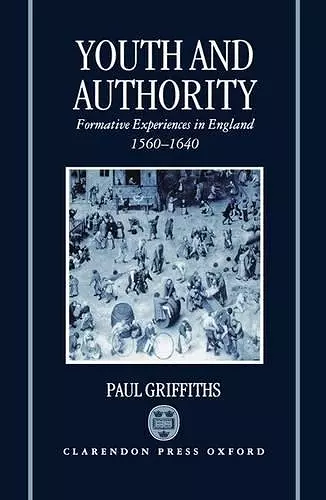Youth and Authority
Formative Experiences in England 1560-1640
Format:Hardback
Publisher:Oxford University Press
Published:4th Apr '96
Currently unavailable, and unfortunately no date known when it will be back

Winner of the Whitfield Prize for 1996
Youth and Authority in England 1560-1640 is the fullest treatment of age relations in early modern society, and fills an important gap in our knowledge of this period. Paul Griffiths's stimulating book raises questions about the usual depiction of young people, showing that they had a creative presence, an identity, and a historical singificance which has never been fully explored.It is now well-known that there was a separate age of youth in sixteenth-and seventeenth-century society (and before) but in much of the writing on this subject, youth has emerged as a passive construct of the adult society, lacking formative experiences. Paul Griffiths seeks to redress this imbalance by presenting a more `positive' image of young people, showing that they had a creative presence, an identity, and a historical significance which has never been fully explored. The author looks beyond the prescriptive codes of moralists and governors to survey the attitudes and activities of young people, examining their reaction to authority and to society's concept of the `ideal place' for them in the social order. He sheds new light on issues as diverse as juvenile delinquency, masculinity, the celebration of Shrovetide, sexual behaviour and courtship, clothing, catechizing, office-holding, vocabularies of insult, prostitution, and church seating plans. His research reveals much about the nature of youth culture, religious commitment, and master/servant relations, and leads to the identification of a separate milieu of `masterless' young people. Contemporary moralists called youth `the choosing time', a time of great risks and great potential; and the best time to incalculate political conformity and sound religion. Yet the concept of choice was double-edged, it recognized that young people had other options besides these expectations. This ambiguity is a central theme of theis book which demonstrates that although there was a critical politics of age during this period, young people had their own initiatives and strategies and grew up in all sorts of ways.
contains a wealth of fresh information ... He richly documents a host of topics relating to the young ... a substantial contribution to early modern social history. * A. L. Beier, Urban History *
The source base is large and Griffiths makes particularly good use of municipal court records, asking plenty of interesting questions and discovering the material to supply the answers. The bibliography will be a wonderful tool for future researchers. * Linda Pollock, Tulane University, The Economic History Review, Volume L, No. 1, February 1997 *
- Winner of Winner of the Whitfield Prize for 1996.
ISBN: 9780198204756
Dimensions: 242mm x 166mm x 33mm
Weight: 883g
472 pages